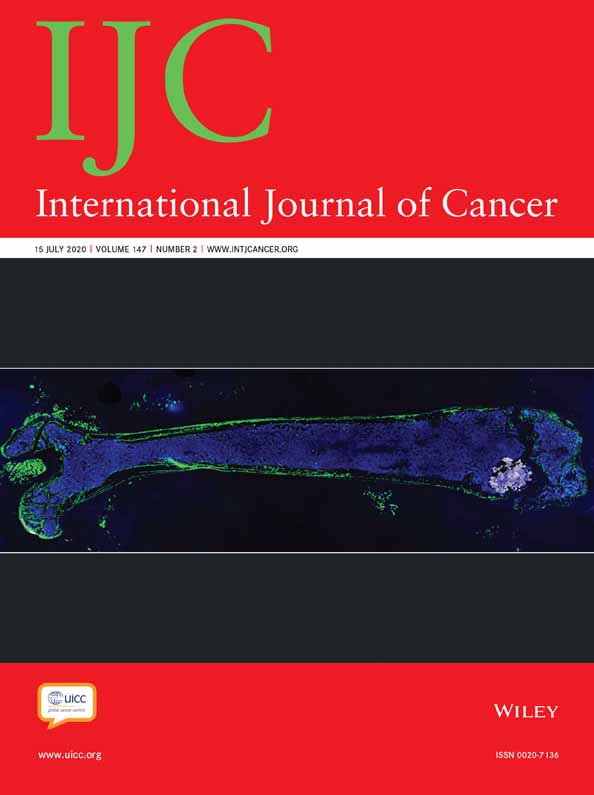Letter to the Editor
Comments on “Should we consider gallbladder cancer a new smoking-related cancer? A comprehensive meta-analysis focused on dose-response relationships”
Emma E. McGee,
Emma E. McGee
Department of Epidemiology, Harvard T.H. Chan School of Public Health, Boston, Massachusetts, USA
Division of Cancer Epidemiology and Genetics, National Cancer Institute, Rockville, Maryland, USA
Search for more papers by this author Jill Koshiol,
Corresponding Author
Jill Koshiol
Division of Cancer Epidemiology and Genetics, National Cancer Institute, Rockville, Maryland, USA
Correspondence
Jill Koshiol, Infections and Immunoepidemiology Branch, Division of Cancer Epidemiology and Genetics, National Institutes of Health, National Cancer Institute, 9609 Medical Center Drive, Room 6-E212, Rockville, MD 20850.
Email: [email protected]
Search for more papers by this author
Emma E. McGee,
Emma E. McGee
Department of Epidemiology, Harvard T.H. Chan School of Public Health, Boston, Massachusetts, USA
Division of Cancer Epidemiology and Genetics, National Cancer Institute, Rockville, Maryland, USA
Search for more papers by this author Jill Koshiol,
Corresponding Author
Jill Koshiol
Division of Cancer Epidemiology and Genetics, National Cancer Institute, Rockville, Maryland, USA
Correspondence
Jill Koshiol, Infections and Immunoepidemiology Branch, Division of Cancer Epidemiology and Genetics, National Institutes of Health, National Cancer Institute, 9609 Medical Center Drive, Room 6-E212, Rockville, MD 20850.
Email: [email protected]
Search for more papers by this author
First published: 10 April 2020
No abstract is available for this article.
REFERENCES
- 1 IARC. Working Group on the Evaluation of Carcinogenic Risk to Humans. IARC Monographs on the Evaluation of Carcinogenic Risks to Humans, No. 100E. Lyon, France: International Agency for Research on Cancer; 2012.
- 2Lugo A, Peveri G, Gallus S. Should we consider gallbladder cancer a new smoking-related cancer? A comprehensive meta-analysis focused on dose-response relationships. Int J Cancer. 2019 [Epub ahead of print].
- 3McGee EE, Jackson SS, Petrick JL, et al. Smoking, alcohol, and biliary tract cancer risk: a pooling project of 26 prospective studies. J Natl Cancer Inst. 2019; 111: 1263-1278.
- 4Akiba S. Analysis of cancer risk related to longitudinal information on smoking habits. Environ Health Perspect. 1994; 102: 15-19.
- 5Chow WH, McLaughlin JK, Hrubec Z, Fraumeni JF. Smoking and biliary tract cancers in a cohort of US veterans. Br J Cancer. 1995; 72: 1556-1558.
- 6Jee SH, Samet JM, Ohrr H, Kim JH, Kim IS. Smoking and cancer risk in Korean men and women. Cancer Causes Control. 2004; 15: 341-348.
- 7Yun YH, Jung KW, Bae J-M, et al. Cigarette smoking and cancer incidence risk in adult men: National Health Insurance Corporation Study. Cancer Detect Prev. 2005; 29: 15-24.
- 8Blakely T, Barendregt JJ, Foster RH, et al. The association of active smoking with multiple cancers: national census-cancer registry cohorts with quantitative bias analysis. Cancer Causes Control. 2013; 24: 1243-1255.
- 9Kimura W. Congenital dilatation of the common bile duct and pancreaticobiliary maljunction: clinical implications. Langenbecks Arch Surg. 2009; 394: 209-213.
- 10VanderWeele TJ, Ding P. Sensitivity analysis in observational research: introducing the E-value. Ann Intern Med. 2017; 167: 268-274.




